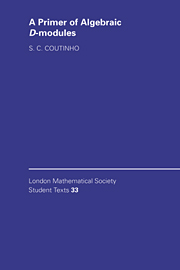Book contents
- Frontmatter
- Contents
- Preface
- Introduction
- Chapter 1 The Weyl algebra
- Chapter 2 Ideal structure of the Weyl algebra
- Chapter 3 Rings of differential operators
- Chapter 4 Jacobian Conjecture
- Chapter 5 Modules over the Weyl algebra
- Chapter 6 Differential equations
- Chapter 7 Graded and filtered modules
- Chapter 8 Noetherian rings and modules
- Chapter 9 Dimension and multiplicity
- Chapter 10 Holonomic modules
- Chapter 11 Characteristic varieties
- Chapter 12 Tensor products
- Chapter 13 External products
- Chapter 14 Inverse Image
- Chapter 15 Embeddings
- Chapter 16 Direct images
- Chapter 17 Kashiwara's theorem
- Chapter 18 Preservation of holonomy
- Chapter 19 Stability of differential equations
- Chapter 20 Automatic proof of identities
- Coda
- Appendix 1 Defining the action of a module using generators
- Appendix 2 Local inversion theorem
- References
- Index
Chapter 10 - Holonomic modules
Published online by Cambridge University Press: 29 December 2009
- Frontmatter
- Contents
- Preface
- Introduction
- Chapter 1 The Weyl algebra
- Chapter 2 Ideal structure of the Weyl algebra
- Chapter 3 Rings of differential operators
- Chapter 4 Jacobian Conjecture
- Chapter 5 Modules over the Weyl algebra
- Chapter 6 Differential equations
- Chapter 7 Graded and filtered modules
- Chapter 8 Noetherian rings and modules
- Chapter 9 Dimension and multiplicity
- Chapter 10 Holonomic modules
- Chapter 11 Characteristic varieties
- Chapter 12 Tensor products
- Chapter 13 External products
- Chapter 14 Inverse Image
- Chapter 15 Embeddings
- Chapter 16 Direct images
- Chapter 17 Kashiwara's theorem
- Chapter 18 Preservation of holonomy
- Chapter 19 Stability of differential equations
- Chapter 20 Automatic proof of identities
- Coda
- Appendix 1 Defining the action of a module using generators
- Appendix 2 Local inversion theorem
- References
- Index
Summary
The most important An-modules are the holonomic modules, also known among PDE theorists as maximally overdetermined systems. An An-module is holonomic if it has dimension n. Ordinary differential equations with polynomial coefficients correspond to holonomic modules. In this chapter we begin the study of holonomic modules, which will be one of the central topics of the second half of the book.
DEFINITION AND EXAMPLES.
A finitely generated left An-module is holonomic if it is zero, or if it has dimension n. Recall that by Bernstein's inequality this is the minimal possible dimension for a non-zero An-module. We already know an example of a holonomic An- module, viz. K[X] = K[x1, …, xn]. We also know that An itself is not a holonomic module: it has dimension 2n.
It is easy to construct holonomic modules if n = 1. Let I ≠ 0 be a left ideal of A1. By Corollary 9.3.5, d(A1/I) ≤ 1. If I ≠ A1 then, by Bernstein's inequality, d(A1/I) = 1. Hence A1/I is a holonomic A1-module.
This is wonderful source of examples, which will pour forth with the help of the next proposition.
Proposition. Let n be a positive integer.
Submodules and quotients of holonomic An-modules are holonomic.
Finite sums of holonomic An-modules are holonomic.
Proof: (1) These follow from Bernstein's inequality. Let M be a left An module, and N a submodule of M. From Theorem 9.3.2, d(N) ≤ d(M) and d(M/N) ≤ d(M). Since d(M) = n, and using Bernstein's inequality, we deduce that d(N) = d(M/N) are also equal to n. Thus N and M/N are holonomic. Now (2) follows from Corollary 9.3.3 and (1).
- Type
- Chapter
- Information
- A Primer of Algebraic D-Modules , pp. 86 - 96Publisher: Cambridge University PressPrint publication year: 1995



